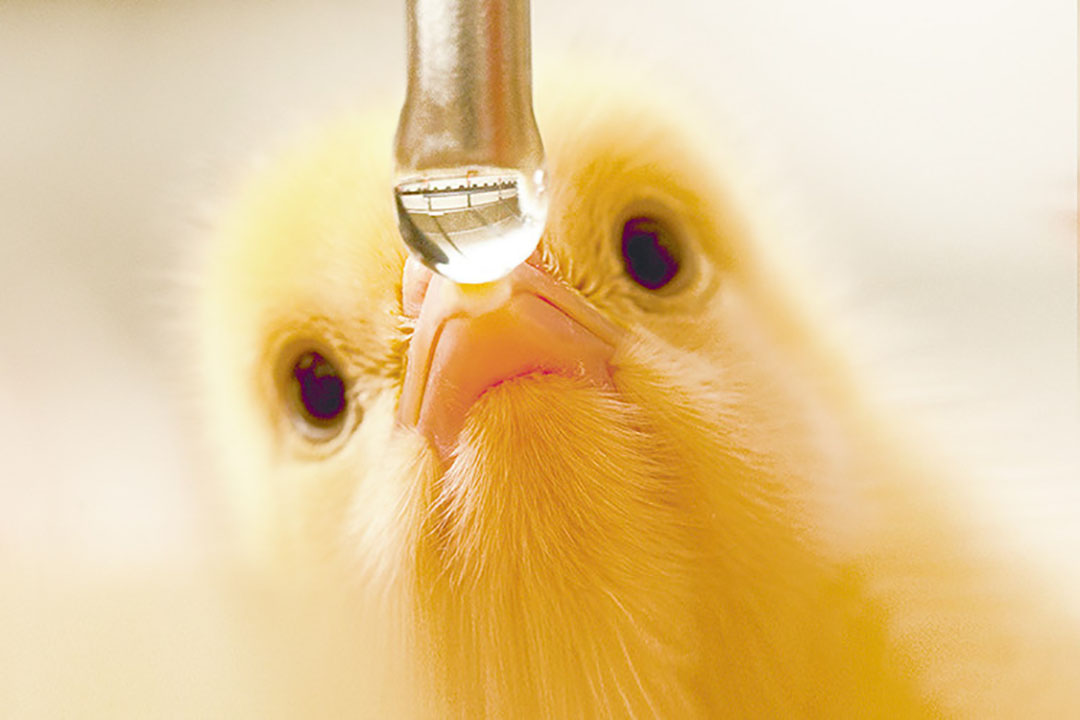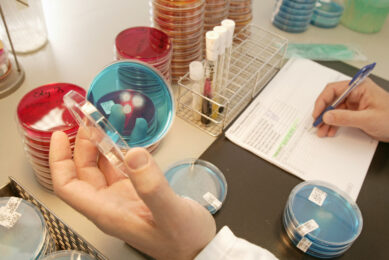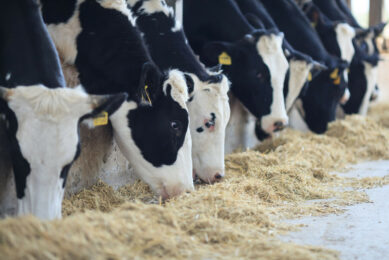Water essential for reducing antibiotics

The common denominator between animal welfare and the reduction of antibiotic use is animal health. And that is a challenge for high-performing animals. You don’t have to tell a farmer that good nutrition is essential, that speaks for itself. Yet the most important nutrient doesn’t always get the appreciation it deserves: namely water.
Water is the nutrient of highest importance, making contaminated water a serious threat to animals and profits. Frequent cleaning and monitoring of the drinking system is necessary to maintain a good quality drinking water. Microbial quality of the water is determined by living organisms in the drinking water. Although tap, bottled or source water may contain a low count of bacteria, a polluted drinking line system can still cause high bacterial pressure at the drinking nipples. Pathogenic bacteria are very capable of transferring an infection to animals via drinking water. To be short; attention to microbial water quality should be focused wider than the source water alone; the drinking line system should also be clean.
Nutritional water additives
The prices of meat products seem to make antibiotics a necessary evil for a profitable business. These antibiotics are used to combat certain undesirable bacteria often in the digestive system. Much of the current research on resistance development focuses on the description of the problem and not on finding a solution. Kanters has chosen to develop water additives that can really help in antibiotic reduction. These alternatives stimulate bacteria that promote health resulting in an increased resistance of animals. Furthermore the alternatives are not a risk to human or animal health, are harmless to the environment and must be applicable within the current laws and regulations.
While antibiotic usage within the livestock industry is steadily reducing over the past decade, we need to keep the animals in good health to reach their full genetic potential. Every stage in the production process of animal protein requires a different approach. Healthy animals ask for clean water, as animals consume at least twice as much water as feed.
Organic acids are successfully used for a good intestinal function during the starter period, before and after feed changes, after vaccinations and to support the protein digestion within the gastrointestinal tract. Buffered organic acids take care of lowering the pH of the drinking water and in the first part of the gastrointestinal tract. Because of the H+ ions the acids have an antimicrobial effect in the drinking water. The effect of the buffered versus non-buffered acids is demonstrated in the stomach and gastrointestinal tract of the animal. Buffered acids are mainly effective in the GI tract and drinking water, while non-buffered acids will resolve in the drinking water. To optimise results it is therefore recommended to use a blend of organic acids which are buffered.

Water helps during stressful periods
Drinking water is an excellent tool to also reach the animal during stressful or challenging periods. During these periods animals will decrease their feed intake but maintain their water intake. Adding nutrients via drinking water enables the poultry and pig farmer, veterinarian, or technician to react directly, resulting in the supply of extra nutrients on the exact moment animals need them the most. This is the key of success for nutrition via drinking water. Because drinking water nutrition will actively promote and maintain a good intestinal health at different life stages, this will result in a robust animal and the need for antibiotics is minimised.
Mineral-chelates and sulphates
Copper and zinc both play an important role in diverse body processes. Especially copper is well known for its role in the first line of defence in the immune system namely, the production of acute phase proteins. The advantage of using minerals in chelated forms (organic form), instead of sulphate (inorganic form), is that the binding with chelates ensures a better uptake. The low pH in the stomach dissolves the binding between the mineral and sulphates. The unbound trace elements easily connect to new elements and can form new insoluble complexes. In this way 80–95% of the inorganic trace elements that are fed are lost as insoluble products in the manure. Chelate bound trace elements are bound to multiple amino acids to ensure the trace element remains bound at a low pH. Approximately 85% of the trace element in chelate form reach intact the place of destination, namely the wall of the small intestine, where it is absorbed into the bloodstream. The increased uptake results in a higher biological availability. To achieve antibiotic reduction it is important that for all kinds of situations and health issues solutions are present that make a positive contribution to the recovery of animal health and improve the operating result. Kanters developed a health concept with an holistic approach divided into five functional groups:
- Cleaning and disinfection agents
- Support for lasting animal health
- Care products for better animal welfare
- Supporting gut health
- Promoting technical results
Within each functional group, the products may vary depending on the species, type of animal, but also farm specific situation. Therefore, it is important that before coming to an approach, to conduct a farm analysis first. This analysis and the subsequent farm program allows working together with a vet and feed supplier to support the farm the best.
Dosing technology
Next to supplying nutrients to animals via the drinking water, also the dosing should be right. Kanters Technics develops, produces and supplies systems that are used for dosing liquid nutritional supplements to water and feed and also for cleaning and disinfection of drinking water. With sustainable technology Kanters contributes in an efficient way towards animal health and welfare in (intensive) livestock farming. Ensuring high drinking water quality and accurate administration of nutritional supplements to water and feed are the most important factors to each business.
Author: Erica Bongers, Kanters







